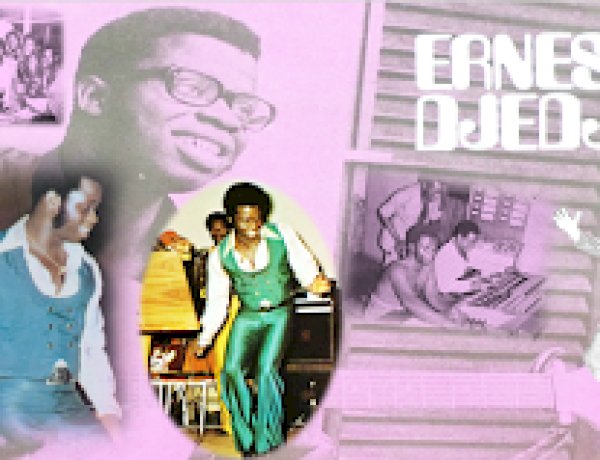Ernesto Djédjé

Ernest Djedje Ble Loue was born in 1947 in Bete country Ivory Coast in village Tahiraguhe near the town Daloa. Djedje's father was a Senegalese Wolof man, but his mother came from the Bete people who surrounded him in his village Daloa. Together with his friend Mamadou Kante, Ernesto Djedje founded in the1963 his first band called The Antelopes.
The band gave concerts in Dalao and also throughout the western Ivory Coast. In 1965 Amedee Pierre recognized the talent of Mamadou and Ernesto and recruited all the two teenagers in his band Ivoiro Star, leading Dope band of the time. Mamadou became bass player and Ernesto guitarist. From 1965 to the 1968 Ernesto Djedje was also conductor of Ivoiro Star Band.

Paris 1968 - 1973
In 1968 he then decided to also emigrate to the Paris to also study computer science. He then became one of the few immigrants in France in the 1960's. In France he met several African music celebrities also such as the Manu Dibango, Anouma Brou Felix and Francis Lougah. With their cooperation, including that of Manu Dibango, recorded his first record entitled Anowa in 1970.

It was a 45prm single, strongly influenced by American Soul and the Rhythm & Blues. Another 45rpm single, Gniah-Pagnou followed within a year. In 1971 he released two more 45rpm singles N'wawuile and the Lourognon gbla with 'l'Orchestre Reeba'. After this four records, released on the Philips record label, he records two more 45rpm singles in the 1973, Mahoro and Zokou gbeuly on the Fiesta record label. Shortly after he decides to return to Ivory Coast.

A period of musical research 1973 - 1976
Back in Ivory Coast Ernest Djedje begins his efforts to modernize the Ivorian music. He wants to revolutionize the Ivorian music by mixing elemets of Western Disco, Funk, Cuban Rumba and Central African pop music like Makossa with traditional Ivorian music.

When travelling to Nigeria he discovers the Afrobeat of Fela Anikulapo Kuti, a mix of tradional Yoruba Rhythms, Funk, Jazz and also Highlife. A musical style that sticks to his desires. Finally he feels capable to combine dance and disco Bete, with lyrical songs 'Tohourou', Rhythm & Blues and his own locally-based guitar style.
In this period he then released Aguisse, on the record label of Gbadamassi Raimi, aka Badmos. He calls result of his experiments 'Ziglibithy', the music which soon will bring him fame in Ivory Coast and later throughout West Africa.

The National Gnoantre 1977 - 1983
During 1977 he spent six months in Lagos, Nigeria to record his first LP Zibote in cooperation with Badmos, founder of Badmos Store and the Maikana record label. The album became an instant hit in Ivory Coast and the rest of West Africa. Djedje was devoted 'best musician of the year' and his band which consisted of the Diabo

Steck, Bamba Yang, Len Sina, Eugene Gba, Yode, Tagus, Assale Best and Abu Yubla, became famous by their exciting stage performances. With his second LP Ziglibithiens, which came out in 1978, Djedje reached the top of his fame. He is also discribed as 'Gnoantre National', the man with whom a nation fight, because 'Gnoantre' means struggle/fight in the Bete language.
Filosophy professor Yacouba Konate said the following about Ernesto Djedje and his Ziglibithy music; Better than any theory of authenticity, better than any speech advocating a return to sources, Ziglibithy gives meaning and shape to the will of Africans who want to feed on the sap of their roots.

It's an action, a recreation that a new aesthetic based on the cultural and historical base of Ivorian society. He becomes the icon of a generation in the search of a new identity, modernizing culture of Western influence while tapping into Ivorian culture. Ziglibithiens is followed by the albums Golozo (1979, Azonade in (1980) and Zouzoupale (1981) and then Tizere (1982).
The artist finished his career with the album Tizere including a song in tribute to the politician Konan Bedie in 1982 and another, dedicated to President Felix Houphouet-Boigny called Zeguehi. At that time Ernesto Djedje-close to the single ruling party, the PDCI-RDA-was the "darling" of President Felix Houphouet-Boigny and Bedie.

No conference or reception of presidential importance was organized without a performance of national Gnoantre. He was often invited to perform with the orchestra of the Ivorian Radio and Television. He then made the heyday of Radio Cote d'Ivoire, including after his sudden death in June 1983 in Yamoussoukro.

Death: Mysterious Disappearance
Ernesto Djedje died suddenly on the June 9, 1983 at the military hospital in the Yamoussoukro at the age of 35 years. His death then constituted a shock to the Ivorian nation. Officially, the artist passed on subsequent to poisoning after his return travel from Ouagadougou in Burkina Faso during a meal at Yamoussoukro.
To date, no survey result is available. Several assumptions and rumors circulated about his death, rumors by the press obligingly ivoirienne. On the July 30, 1983 his body was displayed at the Stade de Tahiraguhe. His funeral will take several days with the delivery of several artists including Alpha Blondy.


